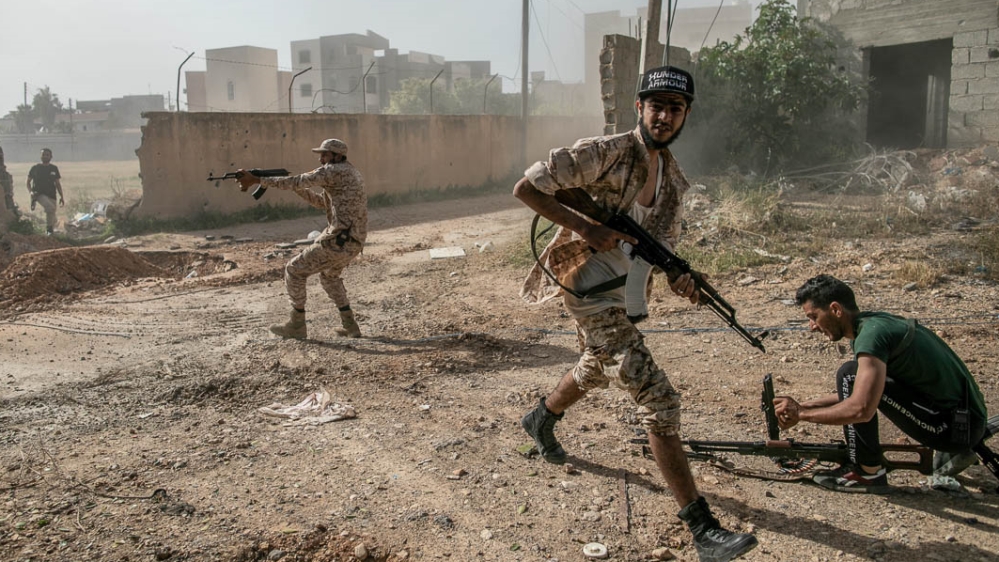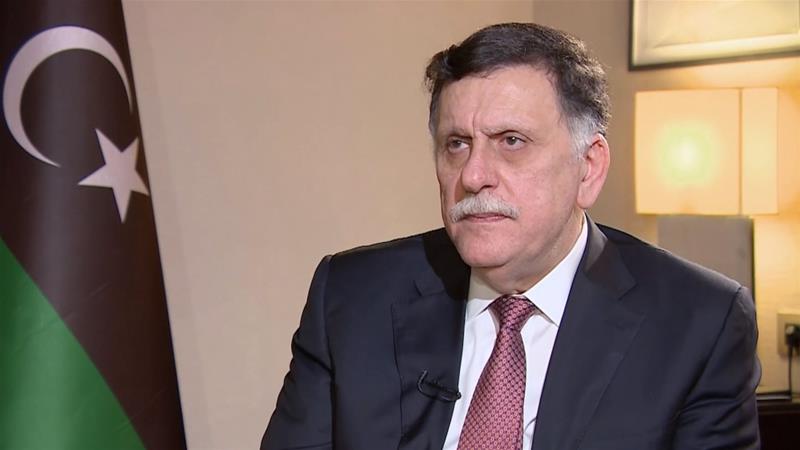![Turkey's military helps turn the tide in Libyan civil war Fighters loyal to the UN-recognised government gesture in celebration in the coastal city of Sabratha [Mahmud Turkia/AFP]](https://www.aljazeera.com/mritems/imagecache/mbdxxlarge/mritems/Images/2020/4/27/430e62b4ffd448debc9cdae084b0cafc_18.jpg)
Misrata, Libya - It has been more than a year since renegade general Khalifa Haftar launched his military campaign to capture the capital Tripoli. Now the commander is scrambling to maintain control of his eastern stronghold.
The dramatic turn of events can be attributed to one major development: support from Turkey's military, particularly its drone force that has successfully pushed back Haftar's self-styled Libyan National Army (LNA) from Libya's skies.
More:
Haftar was portrayed by his allies as a strongman who could bring stability to Libya, a country engulfed in chaos since the revolution that toppled Muammar Gaddafi in 2011.
After successfully taking control of eastern Libya, Haftar was courted across European and Middle Eastern capitals as an integral partner for any political solution to the Libyan conflict.
Emboldened by support from the United Arab Emirates (UAE), Egypt, Russia and France, Haftar made his move to take Tripoli on April 4, 2019, weeks before a UN-sponsored peace conference, and while Secretary-General Antonio Guterres made an official visit to the country. Guterres urged Haftar to pull back, but the eastern commander ignored the request after receiving what he perceived to be an American green light.
News reports emerged of then-US National Security Adviser John Bolton telling Haftar in a phone call "If you are going to attack, do it quickly" were widely circulated.
'Sacrificed our brothers'
Supported militarily and promoted politically by his allies, many believed Haftar's attack on the capital would achieve its goal in days. His successful bid to seize control of the coastal cities of Sabratha and Surman, west of Tripoli, as well as the strategic city of Gharyan to the south further cemented those beliefs.
However, forces loyal to the internationally recognised Government of National Accord (GNA) mobilised and halted Haftar's advance on Tripoli's southern outskirts.
Adam Alburki was one of the thousands who came from Misrata, 210km (115 miles) east of the capital, to join the fight against Haftar.
"We fought and sacrificed our brothers and friends to bring down a dictator in 2011. We will not allow Haftar to enter Tripoli and turn Libya back to a military state. I will die before I let that happen," he told Al Jazeera.
Alburki was wounded in battle in November of last year. After receiving treatment in Italy, he returned to continue the fight against Haftar's troops. He said there has been a visible change in recent weeks because of the shift in air supremacy in favour of the GNA.
"We used to be afraid of air strikes by the UAE's drones. It stopped us from making any significant counter-offensives because they were extremely accurate," said Alburki.
Despite having air superiority over the Libyan skies for nearly a year, mostly because of UAE-purchased Chinese drones, Haftar's forces became bogged down in southern Tripoli and are now on the retreat, having lost the city of Gharyan in June last year.
Shifting tide
Nearly four months after a mandate by Turkey's parliament to execute a security and maritime agreement signed by the GNA and Ankara, a direct impact is being witnessed on the ground in Libya.
"After this agreement, the Turks began to build up the military force of the GNA to create a balance. The GNA force that is present today is much different in their capabilities, planning, and strategy than before," Mohamed Buisier, a Libyan political researcher based in Dallas, Texas, and a former adviser to Haftar, told Al Jazeera.
While the GNA and LNA both welcomed international calls for a ceasefire so health officials could focus on combatting a possible coronavirus outbreak, continued LNA shelling of Tripoli prompted the GNA to launch a military operation at the end of March.
"Orders were issued to respond forcefully to repeated terrorist attacks on civilians. We are a legitimate, civilian government that respects its obligations to the international community, but is committed before that towards its people and it has an obligation to protect them," the head of the GNA, Fayez al-Sarraj, said in a statement.
Since the launch of the offensive, a significant rise in GNA air attacks has occurred across all fronts, with Turkish drones relentlessly targeting Haftar's critical supply lines to his ground forces.
On April 14, GNA forces with air cover recaptured several western coastal cities - including Sabratha and Surman - within hours, dramatically changing the situation on the ground.
The GNA now has control of the entire western coast, stretching from Tunisia to the city of Abu Grein, about 500km (220 miles) to the east.
'Removing Haftar'
The GNA also began an offensive against Haftar's largest stronghold in western Libya, the city of Tarhouna.
Tarhouna - 70km (30 miles) southeast of Tripoli - is Haftar's command centre for his westward advance, as well as being a critical supply hub for his forces. GNA troops have been on the outskirts of Tarhouna and launching attacks for nearly two weeks.
Turkey's military support has shifted the tide in fighting, noted Buisier.
"It is becoming clear that Haftar's advance on Tripoli has failed. He is now politically and militarily trying to maintain his position in eastern Libya," he said.
"Many say there is no military solution to the Libya conflict, only a political one. I agree - but we must also say there is no political solution without removing Haftar from the Libyan scene."



No comments:
Post a Comment